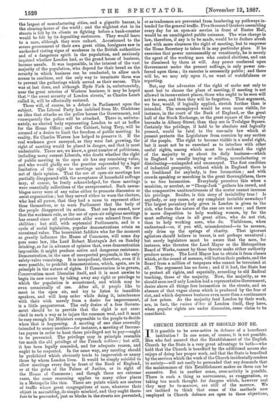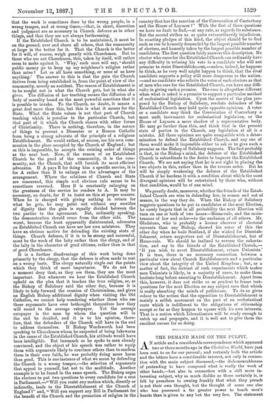CHURCH DEFENCE AS IT SHOULD NOT BE.
JS it possible to be over-active in defence of a beneficent institution ? In one sense, of course, it is not possible. Men who feel assured that the Establishment of the English Church by the State is a very great advantage to both—who hold that the Church is benefited by the additional means she enjoys of doing her proper work, and that the State is benefited by the services which the work of the Church incidentally renders to society—will not easily ba persuaded that any demands that the maintenance of this Establishment makes on them can be excessive. But in another sense, over-activity is possible. There is such a thing as nervousness, as exaggeration, as taking too much thought for dangers which, however real they may be to-morrow, are still of the morrow. We are inclined to think that some of the methods now employed in Church defence are open to these objections,
that the work is sometimes done by the wrong people, in a wrong temper, and at wrong times,—that, in short, discretion and judgment are as necessary in Church defence as in other things, and that they are not always forthcoming. If the Established Church is to be maintained, it must be on the ground, over and above all others, that the community at large is the better for it. That the Church is the better for it will, of course, weigh greatly with Churchmen. But to those who are not Churchmen, this, taken by itself, will rather seem to make against it. Why,' each man will say, 'should public money go to keep up my neighbour's religion rather than mine ? Let us all have something, or none of us have anything.' The answer to this is that the gain the Church derives from being established is, from the point of view of the community, merely an accident. The reason of Establishment is to be sought not in what the Church gets, but in what she gives. The diffusion of her teaching means the diffusion of a body of morality based on the most powerful sanctions that it is possible to invoke. To the Church, no doubt, it means a great deal more than this, but this is what it means for the State. What the State values is not that part of Church teaching which is peculiar to the particular Church, but that part of it which the Church shares with other forms of Christianity. There is nothing, therefore, in the nature of things to prevent a Dissenter or a Roman Catholic from being a strong advocate of the principle of a religious Establishment. He would rather, of course, see his own com- munion in the place occupied by the Church of England ; but as this is impossible, he accepts the existing order of things as the next best. Now, if the reason of an Established Church be the good of the community, it is the com- munity, not the Church, that will furnish its most efficient advocates. If A pays B for doing him a specific service, it is for A rather than B to enlarge on the advantages of the arrangement. Where the relations of Church and State are concerned, this simple and obvious rule seems to be sometimes reversed. Here B is constantly enlarging on the greatness of the service he renders to A. It may be necessary, no doubt, for B to insist on this at proper seasons. When he is charged with giving nothing in return for what he gets, he may point out without any sacrifice of dignity that the gain is equally divided between the two parties to the agreement. But, ordinarily speaking, the demonstration should come from the other side. The worst, because the least apparently disinterested, advocates an Established Church can have are her own ministers. They have an obvious motive for defending the existing state of things. Church defence, if it is to be strong and successful, must be the work of the laity rather than the clergy, and of the laity in the character of good citizens, rather than in that of good Churchmen.
It is a further disadvantage of this work being done primarily by the clergy, that the defence is often made to rest on a wrong basis. The clergy naturally single out the points which they think of most importance. We do not for a moment deny that, as they see them, they are the most important. But whenever we hear the Established Church upheld on the plea that it teaches the true religion, or, as the Bishop of Salisbury said the other day, because it is likely to help forward the reunion of Christendom, and gives an English Bishop additional dignity when visiting the Old Catholics, we cannot help wondering whether those who use these arguments have ever bethought themselves how they will sound to the average ratepayer. Yet the average ratepayer is the man by whom the question will in the end be decided, and it is to his opinion, there- fore, that the defenders of the Church will have in the end to address themselves. If Bishop Wordsworth had been speaking to Churchmen whom he suspected of being lukewarm in the cause of the Established Church, his attitude would have been intelligible. But inasmuch as he spoke to men already convinced, and the object of his speech was rather to equip them with arguments likely to convince others than to confirm them in their own faith, he was probably doing more harm than good. This is one instance of what we mean by defending the Church in a wrong temper,—the selection of arguments that appeal to yourself, but not to the multitude. Another example is to be found in the same speech. The Bishop urges the electors to put two questions to every candidate for a seat in Parliament,—" Will you resist any motion which, directly or indirectly, leads to the Disestablishment of the Church of England!" and, "Will you support any Bill in Parliament for the benefit of the Church and the promotion of religion in the country that has the sanction of the Convocation of Canterbury and the House of Laymen !" With the first of these questions we have no fault to find,—at any rate, as regards its substance. But the second strikes us as quite extraordinarily injudicious. In exacting pledges of this kind, the object should be to find such as can be honestly demanded by the largest possible number of electors, and honestly taken by the largest possible number of candidates. The first question fairly answers this description. No elector who cares for the Established Church can ordinarily have any difficulty in refusing his vote to a candidate who will not promise to resist Disestablishment,—unless, indeed, he happens to think, as he very well might happen to think, that the rival candidate supports a policy still more dangerous to the nation, —and no candidate who solicits the votes of such electors as that of men who care for the Established Church, can have any diffi- culty in giving such a promise. The case is altogether different when what is asked is a promise to support a particular method of ecclesiastical legislation. Upon the merits of the plan pro- posed by the Bishop of Salisbury, resolute defenders of the Established Church may hold quite opposite opinions. A voter or a candidate may think the Convocation of Canterbury a most unfit instrument for ecclesiastical legislation, or the House of Laymen a mere shadow of a representative body. He may go further than this, and think that in the present state of parties in the Church, any legislation at all is a mistake. All three opinions are quite compatible with a deter- mination to defend the Established Church, and any one of them would make it impossible either to ask or to give such a promise as the Bishop of Salisbury suggests. The fact probably is that, in the Bishop's mind, the defence of the Established Church is subordinate to the desire to improve the Established Church. We are not saying that he is not right in placing the two objects in this, rather than in the reverse order. But he will be simply weakening the defence of the Established Church if he burdens it with a condition about which the most divergent opinions will be entertained by those who, without that condition, would be of one mind.
We greatly doubt, moreover, whether the friends of the Estab- lished Church are wise in defending her, in season and out of season, in the way they do. When the Bishop of Salisbury suggests questions to be put to candidates at the next Election, he surely forgets that in all probability the next Election will turn on one or both of two issues—Home-rule, and the main- tenance of law and order—to the exclusion of all others. Mr. Gladstone, who is probably a keener observer of electoral currents than any Bishop, showed his sense of this the other day when he bade Scotland, if she wished for Disestab- lishment, return supporters not of Disestablishment, but of Home-rule. We should be inclined to reverse the exhorta- tion, and say to the friends of the Established Church,— ' If you wish to avert Disestablishment, return Unionists.' It is true, there is no necessary connection between a particular view about Church Establishments and a particular view about the integrity of the United Kingdom ; but, as a matter of fact, the distrust of rash experiments which makes men Unionists is likely, in a majority of cases, to make them hesitate long before assenting to Disestablishment. Apart from this, however, it does not strike us as prudent to frame test- questions for the next Election on any subject save that which is really absorbing the minds of politicians. To do so gives colour to the notion that the opposition to Disestablishment is mainly a selfish movement on the part of an ecclesiastical caste which is indifferent to the obligations of citizenship except so far as they happen to square with its own interests. That is a notion which Liberationists will be ready enough to catch up and propagate, and it is well not to give them the smallest excuse for so doing.












 Previous page
Previous page